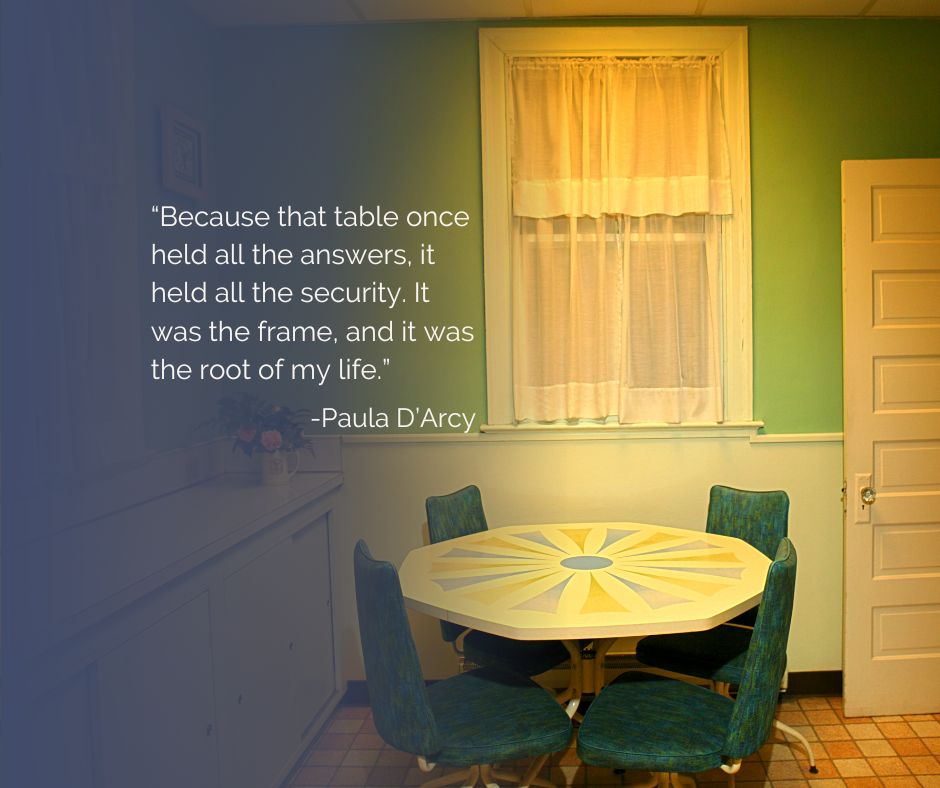What If I’ve Lost My Way?

Speaking of her early stage of faith, writer and retreat leader Paula D’Arcy shared a dream in which the kitchen table of her childhood disappeared. That table symbolized the beautiful security of her early years. It was the heart of her childhood home, where she learned her Baltimore Catechism, mastered every question, and came to know God. It’s where she learned about laws and rules, about the values that were the foundation of her home. It’s where she presented her report cards and waited for her parents’ approval.
Then, in the dream, it vanished.
D’Arcy lost her husband and daughter in a car accident while she was pregnant with her second child. She speaks of returning home. “Because that table once held all the answers, it held all the security. It was the frame, and it was the root of my life.… That table was so many things in that life; and then it became a table where I went in my grief and asked a lot of the questions about the meaning of life, and the extent of the darkness, and how a person got through that amount of pain.”*
When the beloved symbol is taken away, D’Arcy aches of course. But the table had to go, she understands, because it had served its purpose. If she tried to hold onto it or somehow get it back, she couldn’t walk the next leg of her journey.
My table was in our dining room. It was where my mother fed all seven of us kids. It’s where my father read the Bible. It’s where we knelt for family prayers. When I think of typical family life these days, that scene is so beautiful it seems from another world. It’s what I tried in some way to give our kids. I thought that sense of security would follow me all the days of my life. I thought it made me special—that I was part of a protected class, shielded from the regular depredations of life. Of course it could never last. I had to lose my way. The perfect answers had to come up empty. But that is when the path opens onto the next leg of the journey.
Think of it: What is your kitchen table? When was it taken away? How did you find your way to a place of blessing—just without the longed-for security?
*From a 2004 conference at the Center for Action and Contemplation.
Today’s Question:
What if I’ve lost my way?
Question #16 “Of all the things you have done in your life, which is the one you would most like to undo?” comes Thursday March 30.
I have a kitchen table: the Christian hymn. I’ve never lost it. Can’t imagine losing it. But I know, from just a moment’s reflection, I could make it. And then this thought just now: I’d write my own hymns. But of course that’s not the point. The real question is: Could I live a hymn-less life?
But then I thought: hymns are poems set to music. Could I live without poetry? Or music?
I’m sitting here asking these questions, surprised that the answers come so quickly: Yes, of course I could. And the answers come so quickly because I’ve taken this test before. I’ve been to the brink.
It’s not about a table or a hymn or poetry or music. It’s not about physical health or mental health (a dementia-free mind, or a pain-free body). It’s not about a table. It’s about everything, the table and the loved ones who sit around it with me. It’s about everything and everyone, including me.
So, David, the answer I give to your kitchen-table question is not mine; it’s Job’s: “Though he slay me, yet will I trust him.” His is the fundamental answer, the fundamental choice. That’s what it is for me: less a prayer, more a choice.
Which is why, every morning the monk gets up, glances at the skull on his desk and walks out of his cell with a Buddha-smile, heading for the garden with a hoe. Been there. Done that. Done with death. Let’s grab some life.
That’s a pretty “fearless assessment” as they say in your club. Thank you, Michael.
I’d say my grandparents’ house. It was the constant home in a childhood of moving from Navy base to Navy base. Although, it was really my grandparents, and the love they gave. When the house was sold after my grandfather died, and my grandmother moved in with us, I was sad. But I quickly realized that the important part, the love, was always there, whether on this side of the grave or the other. Thanks, David.
Yes—I have been thinking, what about when we have to move at some point—and our grandkids don’t have this place—our home—which is precious to them. Your comments helped me.